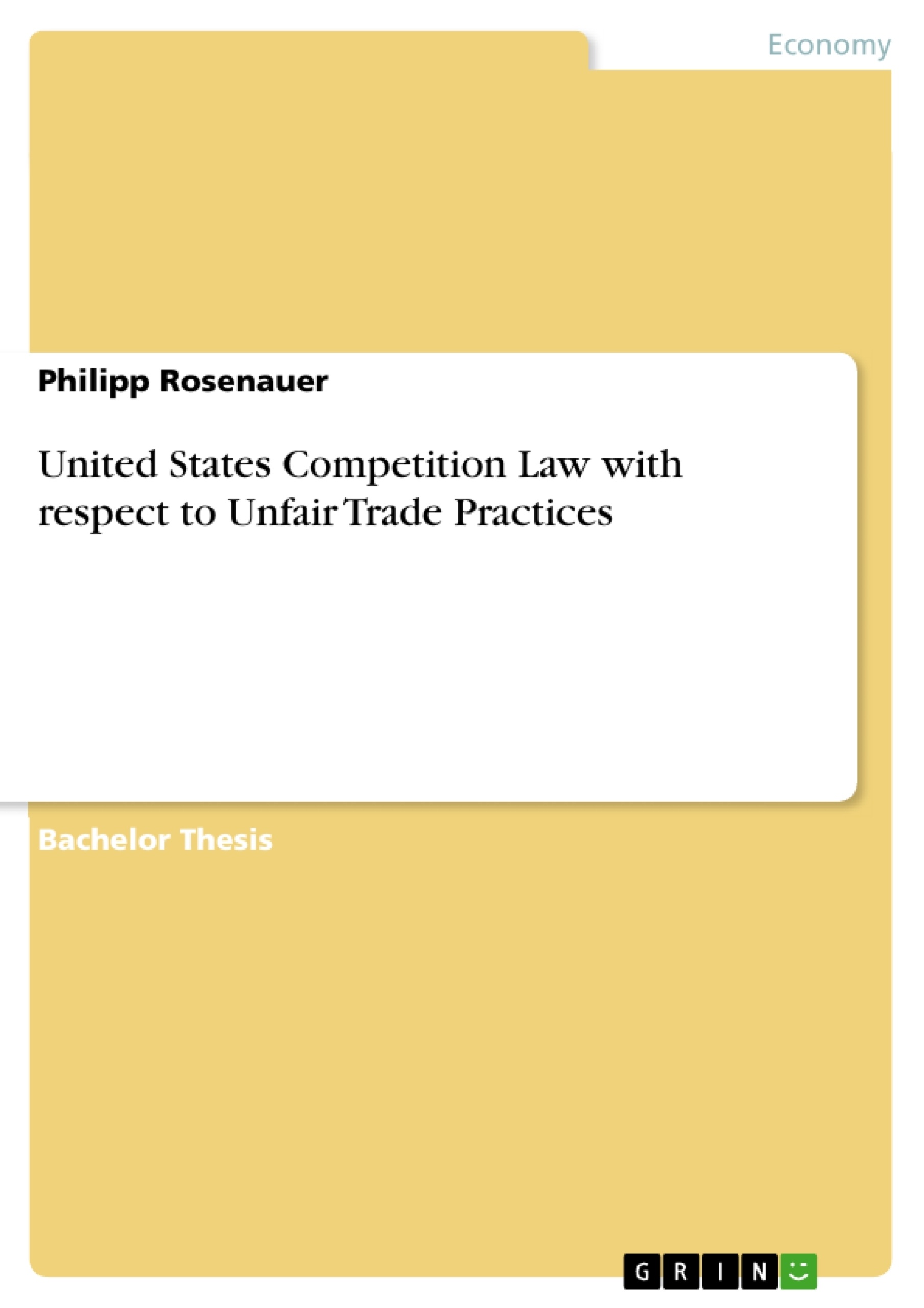According to Black’s Law dictionary, competition is the struggle for commercial advantage. The efforts taken of companies to achieve the respective commercial advantages can be – especially in a
free market economy – ample. Let's illustrate this fact by the following examples: Suppose that a automobile manufacturer, incensed by a car magazine’s constant ridicule of its cars, launches a rival magazine with a similar name and layout, copies the other paper's stories,lures away the employees, advertisers and subscribers of the other magazine by offering them higher wages and lower advertising and subscribing rates and finally succeeds in running its critical
opponent out of business. Has the automobile manufacturer engaged in any unfair trade practices for which the owners of the car magazine may seek legal remedy? Or has the manufacturer acted in
a permissible way to the magazine’s attack? Furthermore, could the magazine be said to have engaged in an unfair trade practice by permanently ridiculing the cars and its manufacturer2?
How can a merger between two or more businesses which are on the same market level and which manufacture similar products in the same geographic region influence consumers? What if two competitors agree in the artificial setting of prices at a certain level, contrary to the workings of the free market?
Do consumers have legal remedies against companies who engage in false advertising or who distribute faulty and dangerous goods?
The body of law which deals with these subjects is known as competition law, which can broadly be divided into Consumer Protection Law and unfair trade practices on the one hand and
antitrust-law on the other hand. The bachelor thesis at hand takes the reader to a journey through competition law with a special insight into Unfair Trade Practices. After the study of the bachelor
thesis the respective reader should be able to generally orientate him- or herself in this highly practice-oriented field of law.
Inhaltsverzeichnis (Table of Contents)
- Preface
- 1. Sources of the law of unfair trade practices and historical development
- 1.1. Common law sources
- 1.2. Statutory, Constitutional and Treaty Sources
- 2. Improper Business Methods
- 2.1. Consumer protection issues
- 2.1.1. Deception and Consumer Protection
- 2.1.2. Special issues regarding deceptive practices and false advertising
- 2.2. Unfair business practices
- 2.2.1. Unfair trade practices in general
- 2.2.2. Special issues regarding unfair practices
- 2.2.3. Excursus: Industrial Espionage and Betrayal of Trade Secrets
- 3. Law enforcement
- 3.1. Federal Law Enforcement
- 3.1.1. The Federal Trade Commission
- 3.1.2. Private Actions under the Lanham Act
- 3.2. State Law Enforcement
- 4. Closing and Acknowledgements
Zielsetzung und Themenschwerpunkte (Objectives and Key Themes)
This bachelor thesis aims to provide a comprehensive overview of United States competition law, focusing on the area of unfair trade practices. The text guides the reader through the historical development, legal sources, and practical applications of this branch of law, culminating in a thorough understanding of the subject matter.
- Common Law Sources of Unfair Trade Practices
- Statutory, Constitutional, and Treaty Sources
- Deceptive Practices and Consumer Protection
- Unfair Business Practices
- Law Enforcement and Regulatory Bodies
Zusammenfassung der Kapitel (Chapter Summaries)
The first chapter examines the historical development and legal sources of unfair trade practices. It delves into the evolution of common law principles and explores how these principles have been codified in statutes, constitutional provisions, and international treaties. The chapter also explores the significance of judicial precedent in shaping the legal landscape of unfair trade practices.
The second chapter delves into the core of improper business methods, focusing on both consumer protection issues and unfair business practices. It discusses the various deceptive practices employed by companies, including false advertising, misleading claims, and deceptive product labeling. The chapter further investigates the range of unfair business practices, such as predatory pricing, market manipulation, and the misuse of trade secrets.
The third chapter sheds light on the mechanisms for law enforcement in the realm of unfair trade practices. It analyzes the role of the Federal Trade Commission (FTC) and its powers to investigate and prosecute companies engaging in unfair practices. The chapter also explores private actions under the Lanham Act, enabling individuals and businesses to seek legal remedies against infringing activities.
Schlüsselwörter (Keywords)
United States Competition Law, Unfair Trade Practices, Consumer Protection, Deceptive Practices, False Advertising, Unfair Business Practices, Predatory Pricing, Market Manipulation, Trade Secrets, Law Enforcement, Federal Trade Commission (FTC), Lanham Act.
Frequently Asked Questions
How does Black’s Law dictionary define competition?
According to Black’s Law dictionary, competition is defined as the struggle for commercial advantage.
What are considered "unfair trade practices"?
These include deceptive practices like false advertising, misleading claims, predatory pricing, market manipulation, and industrial espionage.
What is the role of the Federal Trade Commission (FTC)?
The FTC is the primary federal agency responsible for investigating and prosecuting companies that engage in unfair or deceptive business practices.
Can private businesses sue for unfair competition in the US?
Yes, private actions can be taken under the Lanham Act, which allows businesses to seek legal remedies against competitors for infringing activities like false advertising.
Do consumers have legal remedies against faulty goods?
Yes, consumer protection law, a branch of competition law, provides legal mechanisms for consumers to seek remedies against dangerous or faulty products.
- Quote paper
- cand. iur. Philipp Rosenauer (Author), 2010, United States Competition Law with respect to Unfair Trade Practices, Munich, GRIN Verlag, https://www.grin.com/document/172444



